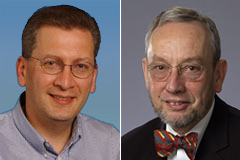Leading the Way for New Technology
BU profs to help head international professional group

The nonprofit Institute of Electrical and Electronics Engineers, with more than 365,000 members worldwide, is an authority on all manner of technical subjects, from consumer electronics to aerospace systems. Now, two Boston University professors are taking on top positions at the IEEE.
The two, Azer Bestavros, a College of Arts and Sciences professor of computer science and department chair, and John Baillieul, a College of Engineering professor of aerospace and mechanical engineering and department chair, were elected in the fall and are currently transitioning into their new posts. They will take up very different leadership roles within this far-flung organization, which oversees conferences, publications, and standards working groups.
Bestavros will head the technical committee on the Internet, which is part of the IEEE’s computer society, the largest of the organization’s 39 discipline-focused societies. Baillieul will become the IEEE’s vice president of publications, services, and products, assuming responsibility for more than 120 journals and magazines published by the organization.
Both Bestavros and Baillieul say part of their challenge will be dealing with the significant changes in engineering in recent years. For instance, the extremely rapid growth of Internet research over the past decade has caused some “pollution of the publication record,” according to Bestavros.
“You don’t want to have too many meetings and conferences, because that fragments our scholarly community,” he says. During his three-year term, he will vet the conferences and industry events, with their attendant papers and presentations, that apply for IEEE sponsorship. “It’s very important that we act as gatekeepers, to make it easier for researchers to find the good, important work and not get lost.”
Bestavros is very much in tune with the Internet’s growth and evolution. In 1994 he helped lead one of the first studies of traffic patterns on the Internet. Over the years, he’s continued to track how and when users access data online, and he coauthored a paper in December about communication patterns in the blogosphere. The paper, which will be presented at next month’s International Conference on Weblogs and Social Media in Boulder, Colo., identifies several differences in communication patterns between traditional Web traffic and the blogosphere. For instance, blog communications tend to be less predictable and are “much more dependent on the social networks that they catalyze.”
While Bestavros is a scholar of the Internet, Baillieul researches robotics and mathematical system theory. Nevertheless, he too says the Web will have a major impact on his role at IEEE. He points to the effects online journals and search engines have had on scholarly and technical publishing.
“About 20 years ago, all scholarly publication was through technical journals,” he says. “People would join organizations in order to have access to the journals so they could keep up with their fields.”
But within the last five years, many journals have migrated online, and some authors have chosen to self-publish their work. “There are search engines that index all of these things,” says Baillieul, who believes his challenge will be finding ways to keep the IEEE’s publishing operations “something that is a real service and worth money.”
Chris Berdik can be reached at cberdik@bu.edu.